

Binge eating disorder in females: A population-based investigation - Kinzl - 1999 - International Journal of Eating Disorders. PsycNET - Display Record. Restrained and unrestrained eating - Herman - 2006 - Journal of Personality. Chronic restrained eating. Handbook of Assessment Methods for Eating Behaviors and Weight-Related ... - David Bradley Allison. A thoroughly up-to-date reference for researchers who specialize in obesity and clinicians who specialize in working with clients with problem eating behaviors, Handbook of Assessment Methods for Eating Disorders and Weight-Related Problems, Second Edition, offers the field's most comprehensive collection of measures and assessment tools related to eating behaviors.
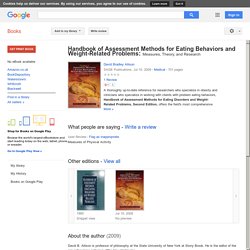
In addition to obesity (an issue that has reached epidemic proportions in the United States), the Handbook deals with problem eating behaviors, eating disorders, and the associated psychological issues that underlie these problems. Blechert et al 2010 to eat or not to eat corrected. The measurement of dietary restraint, disinhibition and hunger: an examination of the factor structure of the Three Factor Eating Questionnaire (TFEQ) Results Summaries of the obtained factors and the subscales derived from them, are shown in Table 1.
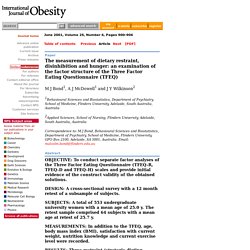
Item numbers in the following descriptions correspond to the original version of the TFEQ.7. The predictive validity of the Dutch Restrained Eating Scale - van Strien - 2006 - International Journal of Eating Disorders. 10. 2007 Construct validation of the Restraint Scale. Assessment of Dietary Restraint: Psychometric Properties of the Revised Restraint Scale in Hong Kong Adolescents. Measurement of Dietary Restraint: Validity Tests of Four Questionnaires. Restrained eating scale. WebImagesMore… Sign in Advanced Scholar Search Scholar About 50,900 results (0.07 sec) Create alert.
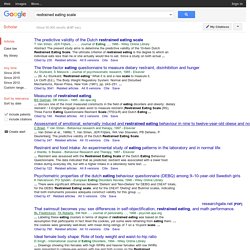
Healthy Cognition: Processes of Self-Regulatory Success in Restrained Eating. Two studies examined self-regulatory success in dieting.
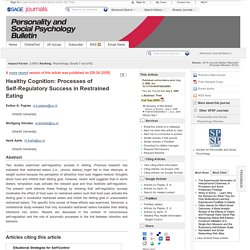
Previous research has indicated that restrained eaters (i.e., chronic dieters) might fail in their attempts at weight control because the perception of attractive food cues triggers hedonic thoughts about food and inhibits their dieting goal. However, recent work suggests that in some dieters, temptation cues activate the relevant goal and thus facilitate self-regulation. The present work extends these findings by showing that self-regulatory success moderates the effect of food cues on restrained eaters such that food cues activate the dieting goal in successful restrained eaters and inhibit the dieting goal in unsuccessful restrained eaters. The specific time course of these effects was examined. Moreover, a correlational study revealed that only successful restrained eaters translate their dieting intentions into action.
Ideal female body shape: Role of body weight and waist-to-hip ratio - Singh - 2006 - International Journal of Eating Disorders. Psychometric properties of the dutch eating behaviour questionnaire (DEBQ) among 9–10-year-old Swedish girls - Halvarsson - 1998 - European Eating Disorders Review. Restraint and food intake: An experimental study of eating patterns in the laboratory and in normal life.
Psychology Department, Institute of Psychiatry, de Crespigny Park, University of London, London SE5 8AF, England Received 18 August 1986, Available online 3 June 2002 Choose an option to locate/access this article: Check if you have access through your login credentials or your institution Check access Get rights and content This study investigated food intake in restrained and unrestrained eaters during normal life, in a laboratory setting, and in the period after taking part in the laboratory experiment.
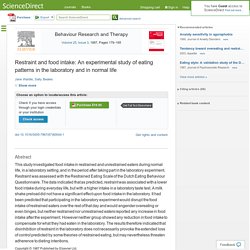
Assessment of emotional, externally induced and restrained eating behaviour in nine to twelve-year-old obese and non-obese children. Shorter communication a Department of Developmental and Personality Psychology, University of Gent, H.
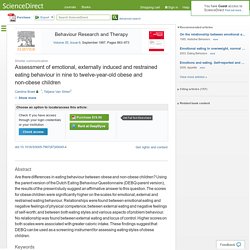
Dunantlaan 2, 9000 Gent, Belgiumb Department of Clinical Psychology, University of Nijmegen, Nijmegen, The Netherlands Received 31 October 1996, Revised 9 April 1997, Available online 15 June 1998 Choose an option to locate/access this article: Check if you have access through your login credentials or your institution. The predictive validity of the Dutch Restrained Eating Scale - van Strien - 2006 - International Journal of Eating Disorders. Restraint theory study: Herman and Mack. Method: 45 female students used in the study all told that it was a study on taste experiences15 PPs in each of the 3 conditionsfirst group received no preloadsecond group were given a milkshake as a preloadthird group were given 2 milkshakes as a preloadall PPs were then given 3 tubs of ice cream and told they could eat as much of it as they wantedall PPs were given a questionnaire to assess their degree of dietary restraint results: for all the groups PPs were divided into either dieters or non dieters sub-groupsthey found that non dieters ate less of the ice cream in the 2 milkshake preload condition that in the one or zero preload conditionsdieters ate significantly more ice cream in the one and two preload conditions than in the zero preload condition About these ads.
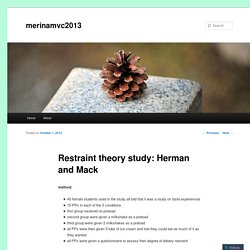
Psychology restraint theory. 4) Explanations for the success or failure of dieting. Restraint theory Klesges et al found that 89% of the female population restrain their food intake at some point in their lives.
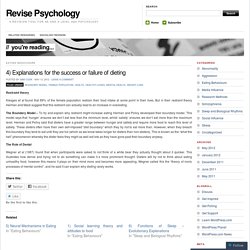
But in their restraint theory Herman and Mack suggest that this restraint can actually lead to an increase in overeating. The Boundary Model – To try and explain why restraint might increase eating Herman and Polivy developed their boundary model. This model says that ‘hunger’ ensures we don’t eat less than the minimum level, whilst ‘satiety’ ensures we don’t eat more than the maximum level. PsycNET - Display Record. Weight, restraint, cognitions and counterregulation. Rutgers—The State University USA Received 12 June 1979, Available online 30 May 2002 Choose an option to locate/access this article: Check if you have access through your login credentials or your institution Check access Get rights and content An experiment was designed to examine restraint theory's assumptions that restraint is a more fundamental variable than weight, that counterregulatory behavior typifies the obese, and that cognitive factors play a role in counterregulation.
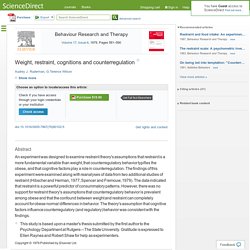
PsycNET - Display Record. Restraint, tendency toward overeating and ice cream consumption - Van Strien - 2000 - International Journal of Eating Disorders. PsycNET - Display Record. The Psychology of Religion and Coping: Theory, Research, Practice - Kenneth I. Pargament. Eating regulation: The role of restraint, dieting, and weight - Lowe - 2006 - International Journal of Eating Disorders. PsycNET - Display Record. PsycNET - Display Record. PsycNET - Display Record. Restraint theory psychology. 88 Polivy etal JAP. Why some fail to lose Weight – Restraint theory. Quick Summary: Restraint theory suggests that restrictive diets lead to failure and in some cases actually increase weight gain.

The theory was developed after research was showing that people on restrictive (don’t eat any of these ‘bad’ foods diets) had almost an 80% rate of failure and people were often gaining back more weight than they had when they started the diet. This post will look at how restraint theory can explain some of the failures of weight loss programs and will finish with a more reasonable solution for people trying to lose weight. Restraint theory has gained increased popularity and as such there is quite a lot of research out there as to its affect on weight loss.
From the research that I read (not all of it) it does not appear that the scientific community has isolated why some people can restrain themselves while others cannot. What is the solution? Fast and dramatic weight loss is an unrealistic goal for the majority of the population. Confluence Balance. Explanations for the success or failure of dieting lpr.
Restraint Theory & Boundary Model - Failure of Diets - Document in A Level and IB Psychology. Restraint Theory (Herman & Mack) This model suggests that restraining our food intake actually increases the risk of overeating, which is why many diets fail and some people even end up putting more weight on. The restrain theory has become synonymous with dieting and suggests that attempting to eat less might be a better predictor of food intake than weigh per se. The restrain theory also argues that restrained eating can lead to both under and overeating.Related research (Mann et al, 2007) Laboratory studies have shown that restrained eaters often overeat after high calorie preloads. Reviews of controlled studies dieting in the real world similarly conclude that reducing calorie input through dieting is not an effective method of losing weight (Wardle & Beadle) Carried out a dietary experiment under laboratory conditions and found that dieters ate more than those in exercise and control groups, concluding that overeating by dieters is caused by the diet itself.
Dietary restraint theory. Evaluate the success of dietary restraint theory in explaining the success or failure of weight control During past few decades psychologists have been trying to explain dietary patterns in individuals which are being controlled with a purpose of weight management, even in a healthy body shape. The main theories that have been developed throughout these years are psychosomatic (emotional eating), externality (externally induced eating cues) and restraint. Restraint theory and its implications for obesity treatment - Ogden - 2009 - Clinical Psychology & Psychotherapy. Eating behaviour, personality traits and body mass. Union Catalogue of Agricultural Libraries in the Netherlands The Wageningen UR Library Catalogue contains bibliographic data on books and periodicals held by the libraries of Wageningen University and Research Centre and some 15 associated libraries.
Holding data are added to each record. Subjects covered include Agrotechnology, Food and Food Production, Plant and Animal Sciences, Soil Science, Geo-information, Landscape and Spatial Planning, Water and Climate, Ecosystem Studies, Economics and Society. The joint collections of the participating libraries cover a substantial part of the internationally available scientific literature in these disciplines. As far as Dutch scientific literature in these fields is concerned, coverage can be considered near 100%, including much of the so-called "grey literature". All titles are entered in their original language. Avoidance coping, binge eating, and depression: An examination of the escape theory of binge eating - Paxton - 1998 - International Journal of Eating Disorders. The Effect of Pre-exposure to Food Cues on the Eating Behavior of Restrained and Unrestrained Eaters.
Regular Article Department of Psychology, University of Toronto Received 5 September 1995, Available online 22 April 2002 Choose an option to locate/access this article: Check if you have access through your login credentials or your institution Check access doi:10.1006/appe.1996.0057. PsycNET - Display Record. PsycNET - Display Record. Emotional, external, restrained eating and overweight in Dutch adolescents - SNOEK - 2007 - Scandinavian Journal of Psychology. Neuroticism and conscientiousness as predictors of emotional, external, and restrained eating behaviors - Heaven - 2001 - International Journal of Eating Disorders. PsycNET - Display Record. PsycNET - Display Record. GetSharedSiteSession?redirect= Beat Overeating Now!: Take Control of Your Hunger Hormones to Lose Weight Fast - Scott Isaacs. Dr. Scott Isaacs is on the faculty of Emory University School of Medicine and is considered one of the leading weight loss experts in the country.
He was referenced several times in Jillian Michael's NYT bestselling book Master Your Metabolism. He has been profiled on CNNHealth.com and WebMD.com, and has been featured in countless national publications including Ladies Home Journal, Better Homes and Gardens, Fitness, Shape, Men's Health, Good Housekeeping, Glamour, Prevention, Women's World, and First. He has provided expert commentary on CNN Health and National Public Radio. Beat Overeating Now!: Take Control of Your Hunger Hormones to Lose Weight Fast - Scott Isaacs. Stress,%20eating%20and%20the%20reward%20system.
“Eating addiction”, rather than “food addiction”, better captures addictive-like eating behavior. <div pearltreesdevid="PTD142" role="alert" class="alert-message-container"><div pearltreesdevid="PTD143" aria-hidden="true" class="alert-message-body"><span pearltreesdevid="PTD144" style="display: inline-block;" class="Icon IconAlert"><svg pearltreesDevId="PTD145" style="width: 100%; height: 100%;" width="24" height="24" focusable="false" tabindex="-1" fill="currentColor"><path pearltreesDevId="PTD146" fill="#f80" d="M11.84 4.63c-.77.05-1.42.6-1.74 1.27-1.95 3.38-3.9 6.75-5.85 10.13-.48.83-.24 1.99.53 2.56.7.6 1.66.36 2.5.41 3.63 0 7.27.01 10.9-.01 1.13-.07 2.04-1.28 1.76-2.39-.1-.58-.56-1.02-.81-1.55-1.85-3.21-3.69-6.43-5.55-9.64-.42-.52-1.06-.83-1.74-.79z"></path><path pearltreesDevId="PTD147" d="M11 8h2v5h-2zM11 14h2v2h-2z"></path></svg></span><!
-- react-text: 55 -->JavaScript is disabled on your browser. 2008 Restrained eating and BMI A longitudinal study among adolescents. Hea 0000123. The psychology of eating. Forthcoming Meule, A. Restrained eaters are rapidly habituating sensation seekers. Binge Eating Disorder and Food Addiction. The Corsini Encyclopedia of Psychology - Irving B. Weiner, W. Edward Craighead. Irving B. Weiner, Ph.D., ABPP, is Clinical Professor of Psychiatry and Behavioral Medicine at the University of South Florida and a Fellow of the American Psychological Association and the Association for Psychological Science. He is currently President of the Society for Personality Assessment and President-elect of the Society of Clinical Psychology. He has written or authored numerous Wiley books, the most recent of which include Adolescence: A Developmental Transition (1995), Principles of Psychotherapy, 2e (1998), Adult Psychopathology Case Studies (2004), and Handbook of Forensic Psychology, 3e (2006).
Google. Food Addiction Institute. The Sugar-Addiction Taboo - Robert H. Lustig. Now that the holidays have come and gone, it’s time to look in the mirror and ask ourselves, “Did I really need to eat the whole box of chocolates?” If you did it in one sitting, you may suffer from Binge Eating Disorder, a newly-sanctioned psychiatric diagnosis in the Diagnostic and Statistical Manual-V by the American Psychiatric Association. But even if you ate the box over several sittings, you might still suffer from its more controversial cousin—Food Addiction, not yet included in the DSM-V. There’s been a lot of heat about food addiction, but little light. The Extraordinary Science of Addictive Junk Food. Replace 'food addiction' with 'eating addiction', say scientists. Thursday September 11 2014 Eating stimulates reward pathways in the brain “Food is not addictive ... but eating is: Gorging is psychological compulsion, say experts,” the Mail Online reports.
The news follows an article in which scientists argue that – unlike drug addiction – there is little evidence that people become addicted to the substances in certain foods. Food Addicts Anonymous. Food addiction manifests itself in the uncontrollable craving for excess food that follows the ingestion of refined carbohydrates, primarily sugar and flour substances that are quickly metabolized and turned into sugar in the bloodstream. Authoritynutrition. Eating healthy and losing weight seems downright impossible for many people. Despite their best intentions, they repeatedly find themselves eating large amounts of unhealthy foods, despite knowing that it is causing them harm. The truth is… the effects of certain foods on the brain can lead to downright addiction.
Food addiction is a very serious problem and one of the main reasons some people just can’t control themselves around certain foods, no matter how hard they try. Food Addiction Signs and Treatments. Associative Learning and Conditioning Theory: Human and Non-Human Applications. Although many professionals in psychology (including the sub-disciplines of human learning and memory, clinical practice related to psychopathology, neuroscience, educational psychology and many other areas) no longer receive training in learning and conditioning, the influence of this field remains strong. Therefore, many researchers and clinicians have little knowledge about basic learning theory and its current applications beyond their own specific research topic.
The primary purpose of the present volume is to highlight ways in which basic learning principles, methodology, and phenomena underpin, and indeed guide, contemporary translational research. Food, Diet and Obesity. The specificity of restrained versus unrestrained eaters' responses to food cues: general desire to eat, or craving for the cued food?
Chocolate in Health and Nutrition. Hedonic Eating: How the Pleasure of Food Affects Our Brains and Behavior - Dr Nicole Avena. Managing and Preventing Obesity: Behavioural Factors and Dietary Interventions. Ouwehand%20Papies%20Appetite%202010. Obesity Prevention: The Role of Brain and Society on Individual Behavior - Laurette Dube. Google. Wake up and smell the cookies. Effects of olfactory food-cue exposure in restrained and unrestrained eaters. Perception of calories and regulation of intake in restrained and unrestrained subjects. Dietary restraint and responsiveness to sensory-based food cues as measured by cephalic phase salivation and sensory specific satiety. Memory for recent eating and its influence on subsequent food intake. Breakdown of dietary restraint following mere exposure to food stimuli: Interrelationships between restraint, hunger, salivation, and food intake.
PsycNET - Display Record. Cephalic phase responses, craving and food intake in normal subjects. Overweight children overeat after exposure to food cues. The specificity of restrained versus unrestrained eaters' responses to food cues: general desire to eat, or craving for the cued food? Exposure to food cues on the eating behaviour of restrained and unrestrained eaters. Eating Behaviour in Response to Olfactory Food Cues: The Role of Dietary ... IJA40. Chocolate in Health and Nutrition. Papies%20Stroebe%20Aarts%20Appetite%20Who%20likes%20it%20more. Ouwehand%20%20Papies%20in%20press. Van%20Koningsbruggen%20Stroebe%20Aarts%20Appetite%202012. The specificity of restrained versus unrestrained eaters' responses to food cues: general desire to eat, or craving for the cued food?
Similar articles for PubMed (Select 14705158) The effect of pre-exposure to food cues on the eating behavior of restrained and unrestrained eaters. The Effect of Pre-exposure to Food Cues on the Eating Behavior of Restrained and Unrestrained Eaters. PS2010 KATIE. PS2010 example data file. PS2010 example data file.